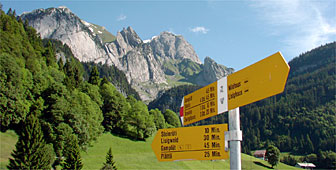New moves to promote eco-tourism

The Swiss government and the tourist industry have agreed to do more to develop and promote eco-tourism.
Some participants at a one-day conference earlier this week in Wildhaus in the eastern Toggenburg region called the meeting a milestone in Switzerland’s long history as a tourist destination.
It was the first time, they said, that government representatives and leading members of the tourist branch declared that nature protection had to become a key element of tourism, and they had followed these words with deeds.
The federal authorities at the conference, which was Switzerland’s contribution to the International Year of Eco-tourism, said subsidies for the creation of new regional parks and eco-tourism projects were in the pipeline.
The decision by the government is in response to new studies showing that most tourists still come to Switzerland because of the country’s natural beauty, and a growing number are interested in eco-tourism and willing to pay more for it.
Large drop
The government is also troubled by other findings, which predict that the number of visitors could drop by up to 30 per cent if the country doesn’t protect what it has. And in this respect, Switzerland lags behind its neighbours.
The economics ministry has for the first time come up with a figure – SFr70 billion – to show the value of the Swiss landscape to the tourist industry.
The figure is based on the average amount spent by tourists who say they are travelling in the country mainly to enjoy its nature and landscape.
“The more urban Switzerland becomes, the more we neglect this beautiful landscape,” said Peter Keller, from the economics ministry who led the conference.
State subsidies
“The [monetary figure] is designed to show that nature protection is very important. This can be a very crucial argument in the fight for funding and state subsidies,” he added. “It is also to show that nature also has a price – a high value. It is becoming scarcer which increases its value.”
As part of the plan to create new nature parks, Switzerland Tourism, the industry’s main marketing organisation, together with the Federal Office for the Environment, has created a label to make these areas better known.
Nature protection is loosely defined by the government. Existing or future parks and reserves will fall into three categories; national parks, landscape parks and nature parks.
Stop desertion
In the latter two categories, human activity including farming and forestry can continue. In fact, the authorities see the creation of the parks as a way of stopping people from deserting remote or economically dire regions. Local inhabitants can use the park label to sell local products aimed mainly at the tourist.
The head of Switzerland Tourism, Jürg Schmid, says his organisation has focussed its marketing energies for the next three years on promoting eco-tourism.
“Our role is to help valleys, villages and areas protect the environment and it is also our role, once they have protected it, to help them promote it so they have a return on their investment in nature protection.”
Until a few years ago, every alpine village and town with the means built cable cars and mountain railways, which they saw as the only way to prosperity. Today, there are about 800 independent mountain railway and cable car companies in Switzerland, but Schmid says many are no longer profitable and will soon disappear.
Infrastructure
Building the right tourist infrastructure is also one of the main concerns of Eugen David, member of the Swiss senate and president of the non-governmental organisation, Swiss Landscape Fund.
“You need infrastructure but not too much,” David said. “You need mobility – tourists have to come here to see the country – but you have to find the best solution, and you have to know when to stop building infrastructure.”
David agrees that to a certain extent eco-tourism is a contradiction in terms but argues that it is the only lifeline for people living in the mountains, who are also the guarantors of an intact nature.
by Dale Bechtel

In compliance with the JTI standards
More: SWI swissinfo.ch certified by the Journalism Trust Initiative

You can find an overview of ongoing debates with our journalists here . Please join us!
If you want to start a conversation about a topic raised in this article or want to report factual errors, email us at english@swissinfo.ch.